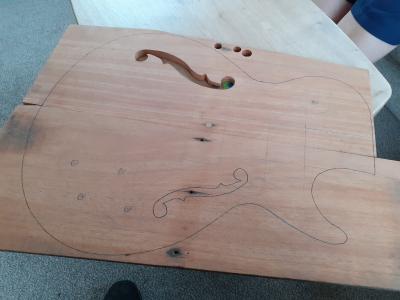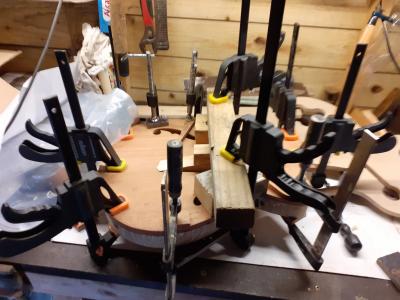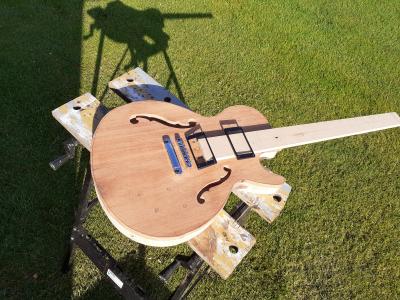I’m curious as to how the softwood body affects the sound of the guitar. Traditional teaching would suggest that it may not be that great but who cares?
As long as you use the right sort of glue for the body/neck join, then it'll sound fine ... proper hide glue made from the 50s recipie
😉
Online guitar making courses – guitarmaking.co.uk
A freind has offered me a piece of mahogany that has been laying in his farm workshop for 15 years. He reckons I could get four necks out of it. It's only 33mm thick, so probably a scarf joint for the headstock. Can I glue a bit on to thicken it at the heel for a set neck, or will it have to be a bolt on. The plank of keruing that I have has now been reallocated to make a new companionway washboard frame for my boat.
@darrenking I think they sound good and perfectly serviceable. Everything is worth challenging and softwoods may not be quite as good as hardwoods, they are perfectly acceptable for the average player, in my opinion. I know other guitar builders who use softwoods a lot, even pine. When plugged into an amp, the acoustic sounds of an electric guitar don’t matter, I don’t think. It can allow us builders to aim for the lower end of the market and still make a profit. Ok, we are never going to be able to match the Chinese on cheap guitars but we can offer customisation and that is where you get the sale. Up to now I have been building and supplying beginners with cheaper (but customised), homemade guitars and they are fine with the materials I use. Plug them in, bash some chords out and feel like a rock star. If I need to improve on anything, it is setups!
I think over the last few decades, an established set of rules has stood and guitar snobbery decides what is acceptable and what is taboo. I never see anything as written in stone or that accepted conventions are immutable and shouldn’t ever be challenged. I don’t want to make cheap crap that will fall to bits, I want things to last so I build them properly. The tone of the guitars I build are absolutely fine, even when compared to more expensive makes and models. I use decent hardwoods for neck construction but the bodies can be almost anything, so long as I get a good connection with neck and body. I tend to make the bodies a bit thicker than normal if using softwoods. I don’t always use softwoods or pallet wood, I use poplar, ash or even maple, anything goes. I am definitely moving away from woods such as mahogany though, I do want this planet to survive and continuing to destroy the Amazon is not something I am comfortable with. Until Brazil vote in a proper, responsible leader, I am boycotting their trade.
I digress, I have strayed from the path a little and I can feel myself descending further into a rant, so I will wrap this up now.
I think softer woods and cheaper woods sound great, even when compared to conventional hardwoods. When you have made someone a custom guitar and they plug it in and give it a blast, the smile on their faces say it all. I haven’t built a high end guitar for a rock star (yet) so the requirements of 99% of people are, plug n play!
Maybe my views will change over the years and I should be prepared for that but for now what I do is working well, people are happy.
Everyone should try it, be experimental, push the boundaries, there is an infinite monkey cage of guitar makers!
It’s good enough for Rock n Roll.
Make guitars, not war 🌍✌️🎸
@robin Check the direction of the grain as you want the neck to be a close to quarter cut as possible ie the running perpendicular to the fret board. If your plank has the grain running across the board then you can just cut two pieces, turn them through 90° and glue them together to give you a 66mm neck blank.No issue with gluing on a heel in either case
@darrenking Thanks for the advice Darren, I'll certainly check the grain. All I know so far is that it's 144x33.5x1880mm, so I should get something useful out of that.
@johnnierox-boo Thank you for taking the time to post such an interesting response and I agree about challenging accepted wisdoms(!)
I am at the sharp end of some very deep seated guitar snobbery (not within this community though) with trying to popularise laminated construction. I was talking to a guitar maker at the London guitar show at the Business Design Centre last year and I asked them if they had sever tried laminating sides. My god, the look on their face!! NO, AND I NEVER WOULD!!! They then just turned their back on me without saying another word. It was like I’d suggested they sell they first born to a troll for breakfast!!
I agree about Brazilian timbers but much of what is sold as ‘Mahogany type timber’ these days is actually Khaya, an African species which is great for necks and bodies. Lovely straight grain, easy to work, not too heavy and a reasonable price.
@robin And if the grain is running at an angle through the plank you can cut two pieces and glue them so that the grain forms a “V” on the end. Its all about trying to make sure the neck doesn’t have a tendency to bend in one particular direction
@darrenking Yes, I can relate this to sailing again, my time hasn't been totally wasted, the same principal as making a wooden mast or spar.
Crafty design work @robin!
A question ... I wonder how the f-holes being out of alignment (and is one smaller than the other?) will look on the finished guitar. If you've moved the lower one just to position it over the hole, might there be a better option of dealing with the hole?
That said, it might just be my prejudice against f-holes in general manifesting itself again!!
Online guitar making courses – guitarmaking.co.uk
@tv1010101 The bottom one is smaller, there's a few reasons why.
I originally hadn't intended to have f holes at all. The top one is there and is so large to disguise the three attempts I had plugging the stained nail hole in the upper half. Having a mirror image of that in the bottom half would interfere with the control knob position (I had already routed the cavity for that. Moving that same f hole forward just wouldn't fit in, either too close to the edge or to the humbuckers. So putting the bottom f hole at narrower part of the body, I scaled the size down proportionally and positioned it not just to remove the nail hole, but also the long black stain. And finally, the cavity in the body behind the f hole won't break into the electrics cavities.
Iv'e cut the second f hole now, so there's no option for it not to look good. I'll post another photo once iv'e cut the cap to body shape.
Iv'e cut the second f hole now
Ahhhh, well, in that case, it looks just fine
?
Seriously, be good to see how this build evolves. Always interesting to watch, and see how all the various challenges get resolved. Looking good so far!
Online guitar making courses – guitarmaking.co.uk






